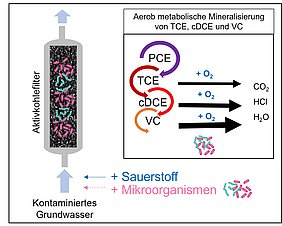In “CKW Aktiv”, microbial aerobic CHC degradation on activated carbon will be established and optimized in laboratory tests. This will be followed by a pilot scale operation of the innovative bioactive carbon filter in the field.
Chlorinated hydrocarbons (CHCs) are highly relevant pollutants that can be found in groundwater worldwide. Physical processes such as activated carbon filtration are already established for the remediation of groundwater. Here, only adsorption processes take place, a regular change and energy-intensive regeneration of the activated carbon is required and the purification performance is usually rather inadequate for CHCs. Bioremediation, in which the pollutants are completely degraded by microorganisms in the groundwater, is an alternative that has so far mainly been used in-situ and for anaerobic-reductive processes. In the case of groundwater contamination with TCE or lower chlorinated compounds, aerobic-metabolic degradation has the advantage that no toxic intermediates (cDCE and VC) are produced and the deterioration of groundwater quality due to undesirable side reactions of the auxiliary substrates, i.e. the formation of hydrogen sulphide and methane, is avoided.
Based on many years of research into aerobic CHC degradation at the Water Technology Centre (TZW) in Karlsruhe, where aerobic TCE degradation was first discovered and published, a number of molecular biological methods are now available to investigate microbiological degradation. It is known from previous projects which groups of organisms and functional genes are involved in TCE degradation. A molecular biological method for the detection of functional genes of the responsible organism has also been established for aerobic cDCE and VC degradation.
The cooperation partner BoSS Consult GmbH (a small to medium-sized enterprise (SME) from Stuttgart) and TZW would now like to utilise the advantages of scientifically proven, aerobic-productive chloroethene degradation and combine it with the well established method of activated carbon filtration. To this end, a bioaugmented activated carbon filter, a so-called bioactivated carbon filter, is to be designed and characterised on the basis of extensive laboratory tests at the TZW and tested at a test site as part of a pilot operation.
The simultaneous regeneration is expected to significantly extend the filter service life. The reduced consumption of activated carbon has a positive effect on cost-benefit analyses in the context of remediation. At the same time, the model-based process description will advance digitalisation in the field of remediation and is of fundamental importance for further technological innovations, such as the future automatic control of remediation systems with regard to the optimisation of environmental conditions for the biological degradation of pollutants.

![[Translate to English:] Prüfstelle-Produktprüfung_Teststand Test centre and product testing](/fileadmin/_processed_/0/9/csm_TZW-Karlsruhe_Pruefung_Geraete-Teststand_377188946c.jpg)

























